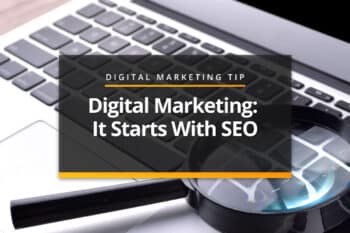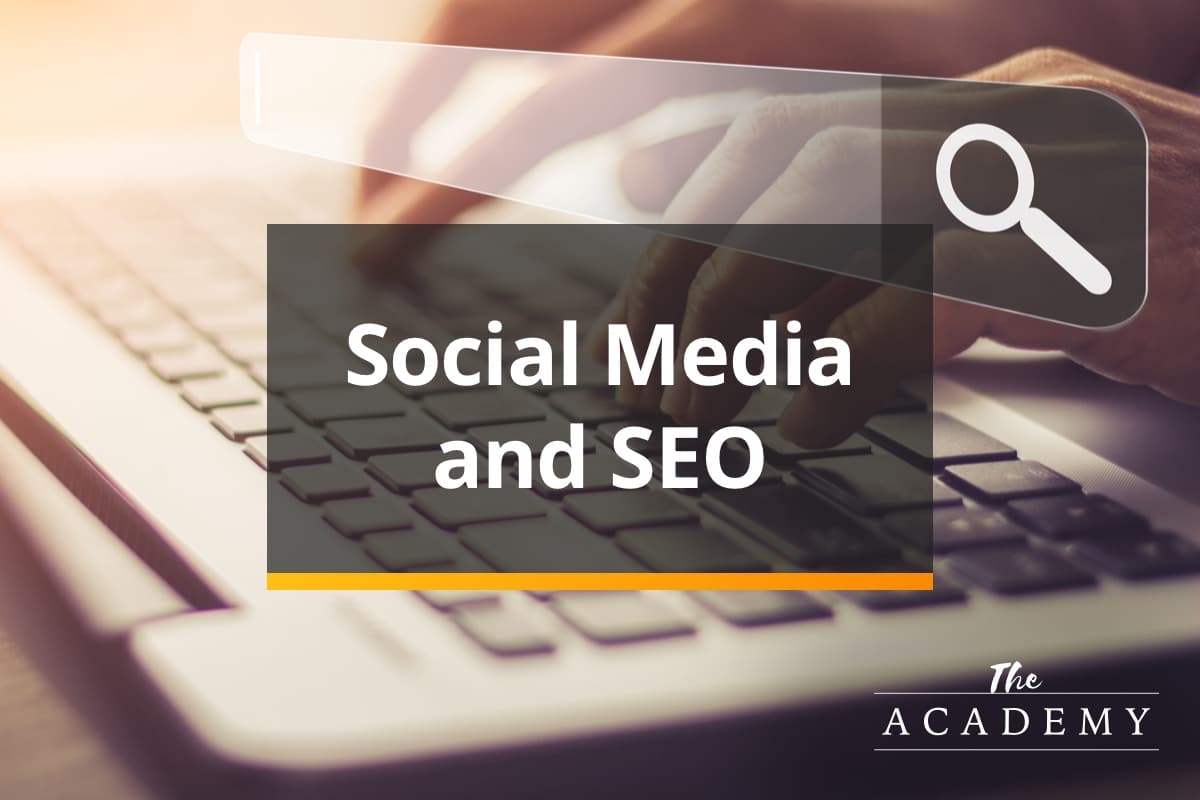
Introduction:
The synergy between social media and Search Engine Optimization (SEO) is a strategic alliance that demands attention. It’s not about elusive secrets or digital wizardry but rather a calculated interplay that businesses can leverage to strengthen their online footprint.
In this exploration, we delve into the tangible connections between social media activities and SEO. No frills, no exaggerated promises—just a pragmatic examination of how a thoughtful social media strategy can complement your SEO goals. Let’s uncover the practical insights that can propel your SEO and Social Media efforts forward.
The Relationship Between Social Media and SEO
First, it must be said that there is no conclusive evidence that social media activity directly affects SEO in terms of organic search engine rankings on search engines. Search engines like Google have stated that social signals, such as likes, shares, and comments on social media platforms, are not direct ranking factors in their algorithms. So if your goal is to somehow directly influence or improve your rankings on Google by posting on social media, this is not the right way to approach the challenge.
That said, The connection between social media activity and the core goals of SEO are nuanced. To clarify, the primary objectives of conventional SEO involve enhancing visibility, specifically in search engine results pages. In theory, when this happens you’ll increase organic traffic to your website. Your goal is to create awareness when a customer is actively searching for what you do or sell online, and then to send them over to your website to take the next action.
So with this in mind, social media activity can directly, and indirectly help you to achieve this goal. If done properly, it can provide a lot of additional benefits within your organization’s holistic growth strategy as well.
Let’s explore the specifics and talk more about how a well-thought-out social media strategy can positively impact and support your SEO efforts, as well as all the ways that the investment and effort can be justified within your organization.
Social media platforms are search engines
First, it must be pointed out that social media platforms have evolved beyond mere networking hubs to function as dynamic search engines in their own right. Users increasingly turn to platforms such as Facebook, Instagram, and Twitter to discover information, products, and services.
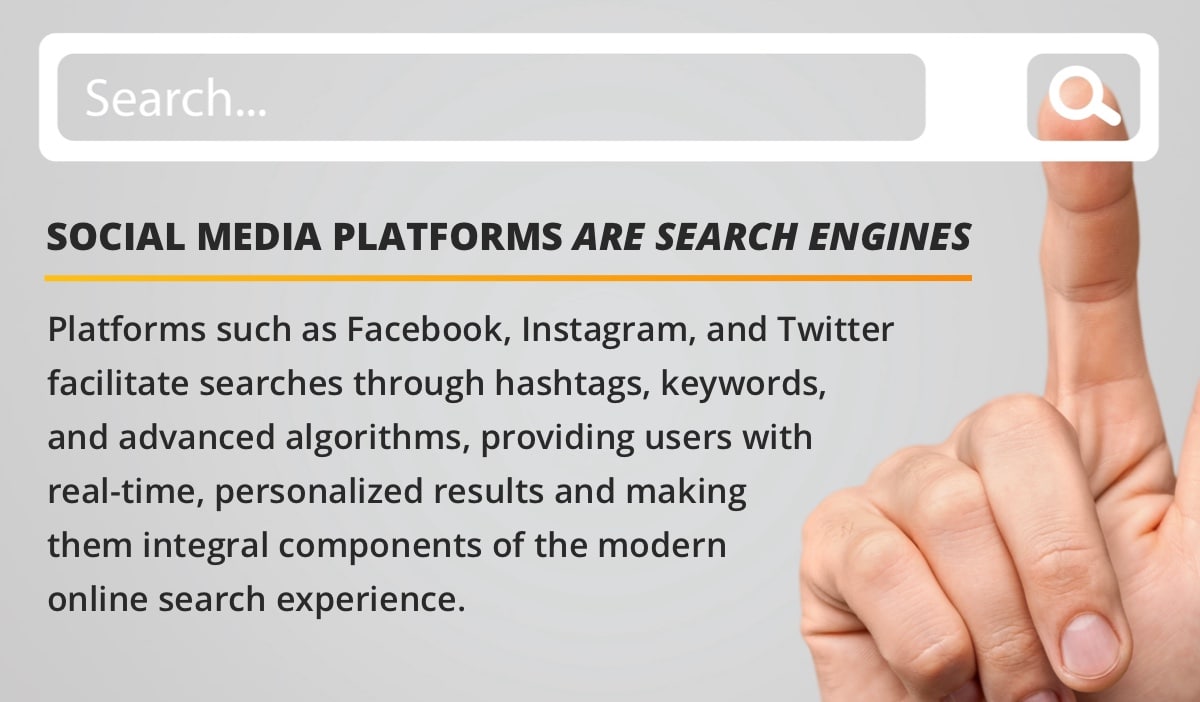
These platforms facilitate searches through hashtags, keywords, and advanced algorithms, providing users with real-time, personalized results. The shift toward social media as a search destination underscores the platforms’ role as comprehensive ecosystems where users not only connect but also actively seek and discover content, making them integral components of the modern online search experience.
One great example is YouTube. If you’re creating video content and posting it to YouTube, then the concept of SEO definitely applies. Every post you make can be optimized in very specific ways and this can directly improve your visibility on the platform. Not only by tagging and creating text that is keyword-rich, but by doing everything you can to improve the positive ranking signals that YouTube loves such as encouraging engagement with your posts with Likes and Comments.
In addition, when properly optimized, and when your profile on YouTube has built authority, your individual posts can show up directly within the organic search results on Google too. So if you approach “SEO” from this angle, the answer is “yes”, social media can actually help with your SEO goals in a number of different ways.
Local SEO vs Traditional SEO
Local SEO is a strategy focused on improving the online visibility of businesses for local-specific searches within a given town or region. The work is geared toward helping businesses appear in search engine results when users are looking for products or services in their specific geographic area only. Local SEO is crucial for brick-and-mortar businesses or those serving a particular locality.
It’s important to know that local SEO is a completely different thing than the traditional broad approach to SEO. This is primarily because Google will provide local-specific results that are displayed differently than the standard organic search results. There are many different factors that influence why a business will rank well in local-specific results, and these factors are completely different than what affects the rankings in traditional organic results.
So again, with that said, it hasn’t been verified that social media activity directly affects anything with these results. But, there is a good chance that behavioral signals and activity can send positive signals that are used by the algorithm at some level. Focus on these positive signals such as linking your social profiles from your Google My Business profile, increasing local followers, and encouraging reviews, likes, shares, and comments. All of this positive momentum can be considered local SEO work. It’s about demonstrating authority, credibility, and relevance in the eyes of the search engines and that can only help your efforts.
Social profiles show up in search results
It must be said now that we’ve made the point that social media activities probably do not directly impact whether your website shows up within the search results, your social media profiles can show up directly in the results when users search for a business, its services, or products.
Search engines recognize the relevance of social media content and often include profiles in the search results. When a user queries a business name or related keywords, the search engine may display a combination of the business’s website, social media profiles (such as Facebook, Twitter, LinkedIn), and relevant content from these platforms.
Optimized social media profiles, consistent business information, and active engagement contribute to higher visibility in search results. This may actually be the first point of contact that a customer has with a business. So the profile should look great, show activity, and provide clear information about what the company does and sells. This optimized and active presence alone is a foundational reason to have a vibrant and active social media presence.
Website Traffic
By actively sharing engaging content across various social media channels, businesses can directly drive traffic to their websites. As we mentioned, this is generally the true goal of all your SEO efforts. Whether it’s a captivating blog post, a visually stunning image, or an informative video, the content shared on these platforms serves as a direct link to the business’s website.
The power of social media extends beyond mere content distribution; it lies in the art of engagement. Crafting posts with compelling calls-to-action adds an interactive dimension, enticing users to not only view but actively participate by visiting the website. Whether the call-to-action encourages exploration, invites participation in a promotion, or leads to exclusive content, it transforms the social media channel into a gateway, steering users toward the brand.
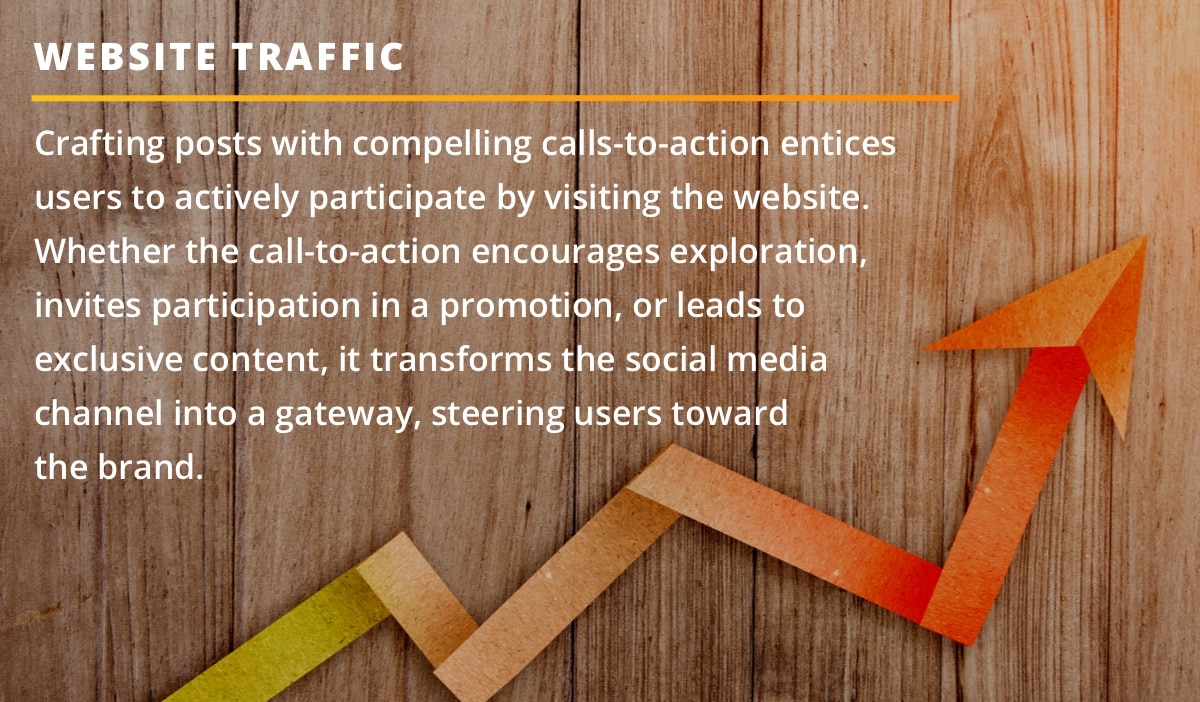
This synergy between captivating content and compelling calls to action transforms social media into a robust vehicle for driving meaningful, qualified traffic to your organization’s website.
Backlinks
The impact of social media activity extends beyond immediate visibility, playing a pivotal role in the realm of what we refer to as backlink generation or link building.
Backlinks, or inbound links, have always been a crucial part of the Google algorithm because they serve as a vote of confidence and credibility from other websites. When a website links to another, it’s essentially vouching for the linked site’s content, authority, and relevance. Google’s algorithms interpret backlinks as a signal that a particular website is trustworthy and valuable to users.
When users find content valuable or relevant, they are inclined to share it within their networks or to link to it from the content on their own website. This creates a ripple effect that transcends the boundaries of individual social media platforms. This organic sharing not only bolsters the content’s exposure but also contributes to the generation of backlinks. These inbound links, originating from diverse sources across the web, are recognized by search engines as indicators of content relevance and authority, ultimately influencing search rankings and online visibility.
This underscores the symbiotic relationship between strategic content promotion on social media and the generation of high-quality backlinks that can directly influence your organic rankings within the search results.
Your Next Steps:
Given the insights into the relationship between social media and SEO, here are some real-world, actionable steps to strategically approach and integrate social media into your digital marketing efforts:
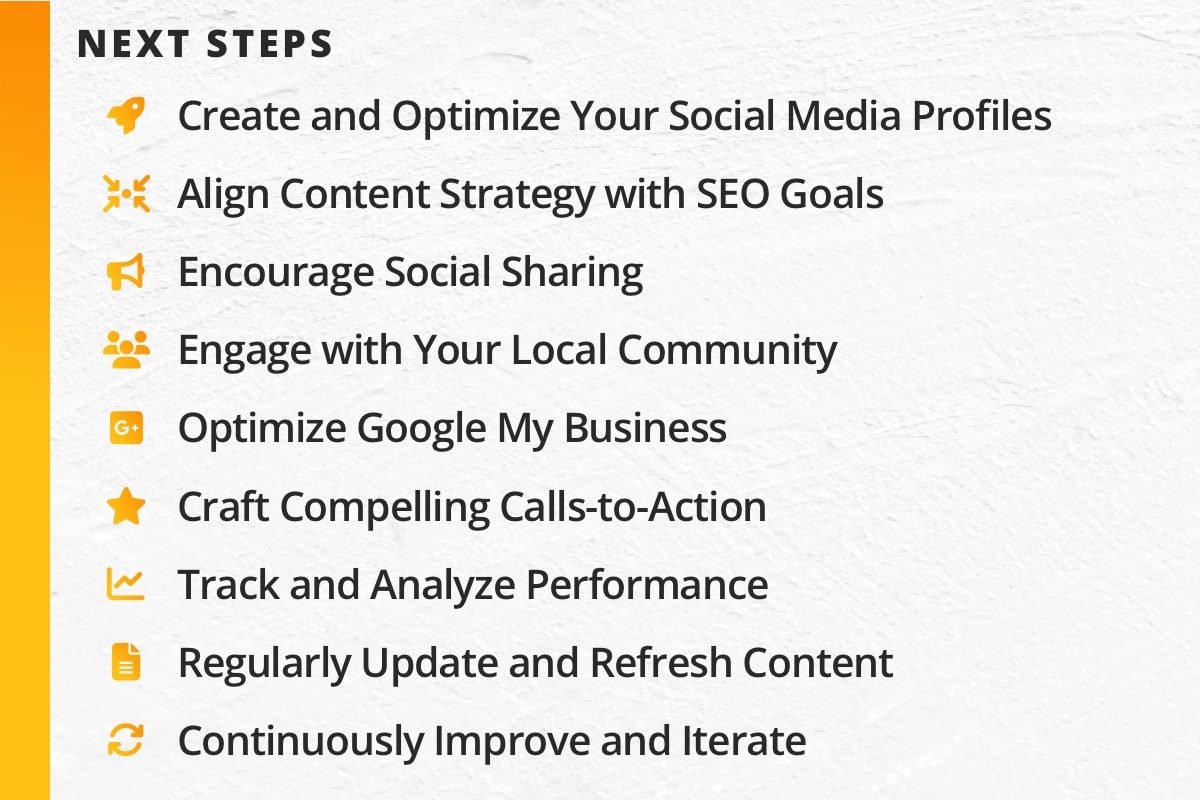
Create and Optimize Your Social Media Profiles
Ensure they are complete, consistent, keyword-rich, and reflect accurate business information. Consider not only setting up accounts on platforms like Facebook, LinkedIn, and Instagram but YouTube and platforms like TikTok if relevant as well.
Align Content Strategy with SEO Goals
Develop a content strategy that aligns with your SEO goals. Create content that is not only engaging but also incorporates relevant keywords and local elements.
Encourage Social Sharing
Implement social sharing buttons on your website to encourage visitors to share your content on their social media profiles. Make it easy for users to amplify your content.
Engage with Your Local Community
Actively participate in local groups and communities on social media. Engage with local audiences by responding to comments, sharing local news, and showcasing community involvement.
Optimize Google My Business
Ensure your Google My Business profile, which could be considered a social platform, is optimized with accurate business information. Link your social media profiles and encourage customers to leave reviews.
Craft Compelling Calls-to-Action
Create engaging social media posts with compelling calls to action that prompt users to visit your website. Craft posts that not only inform but also encourage interaction.
Track and Analyze Performance
Use social media analytics tools to track the performance of your content. Monitor engagement, clicks, and conversions to understand what resonates with your audience.
Encourage User-Generated Content
Encourage your customers to share their experiences and create user-generated content. This not only fosters a sense of community but also provides authentic content for your brand.
Regularly Update and Refresh Content
Keep your social media profiles and website content updated. Regularly share new content, promotions, and announcements to keep your audience engaged.
Continuously Improve and Iterate
Regularly assess the performance of your social media and SEO efforts and the changes going on within the platforms. Identify areas for improvement and continuously iterate your strategy based on insights and data.
In Conclusion
The intricate relationship between social media and SEO unfolds as a strategic interplay that businesses can harness to fortify their online presence. While it’s important to note that social media activities may not directly impact organic search engine rankings, the nuanced connections between these two worlds offer a wealth of opportunities for a well-rounded digital strategy.
The true goal of SEO, creating awareness that drives meaningful and qualified traffic to a website, finds a powerful ally in social media.
Most Popular Articles

Seeing Favicons in Your Google Search Results? Here’s Why…
Have you noticed anything different in your Google Search results lately? Google added tiny favicon icons to its organic search results in January. It was…

Business Growth and Digital Marketing News & Tips 11-17-24
Are you encouraging and rewarding innovation? Lee Cockerell is the former Executive Vice President of Operations at Walt Disney World. A lover of traditional red…

Business Growth and Digital Marketing News & Tips 11-27-24
A culture of gratitude "Feeling gratitude and not expressing it is like wrapping a present and not giving it." – William Arthur Ward Beyond being…

